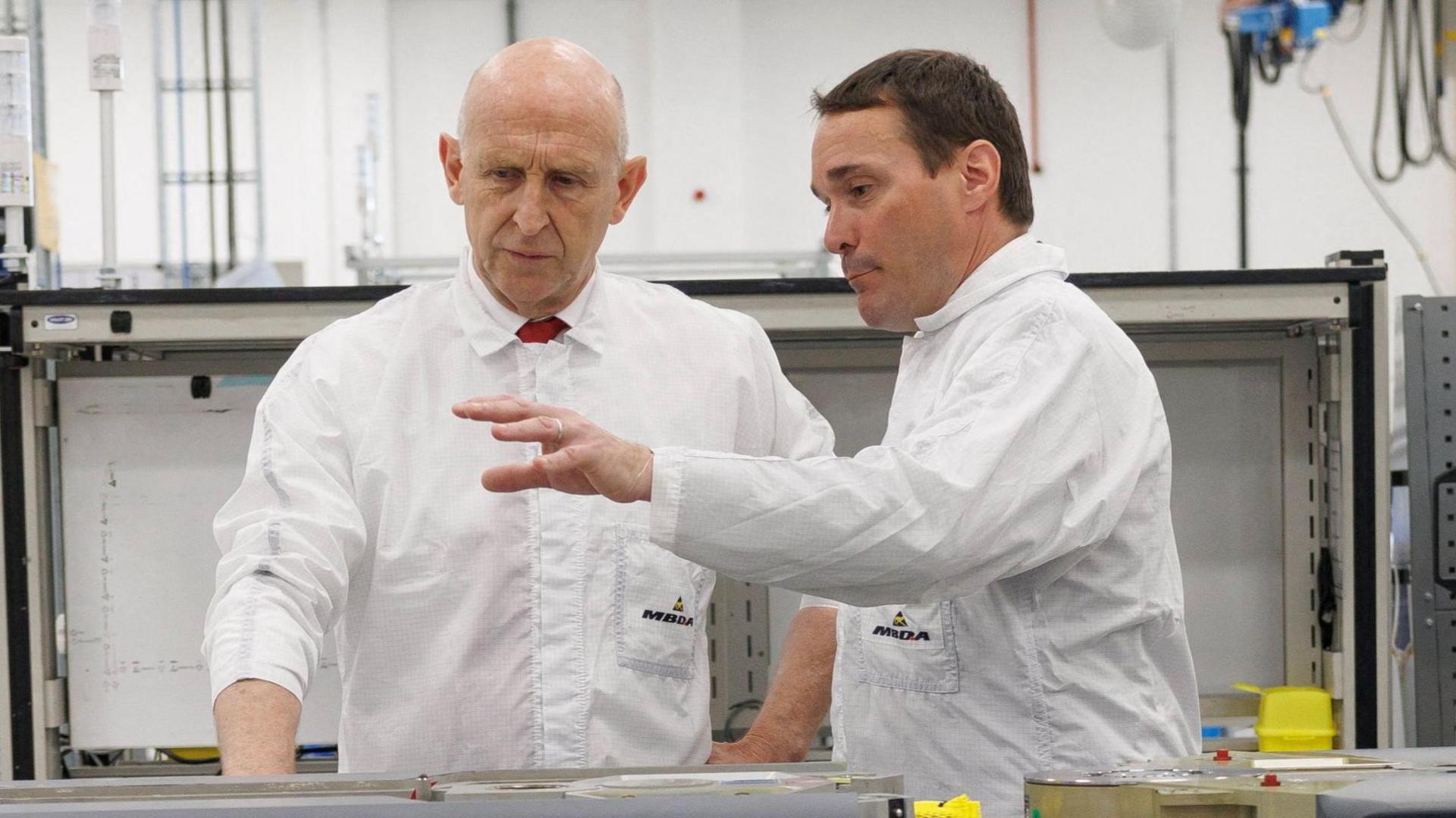Defence review to send 'message to Moscow', says Healey

- Published
The defence review will send a "message to Moscow", the defence secretary has said, as he warned Russia was launching cyber-attacks on UK military networks "every day".
John Healey told Sunday with Laura Kuenssberg the review would set out plans to deter "growing Russian aggression" in a "world that is changing".
The report, to be unveiled on Monday, is expected to conclude the UK faces a "new era of threat" and will warn of the "immediate and pressing" danger posed by Russia and other countries, including China.
It will also commit £1.5bn to build six new factories to make munitions, in a bid to revive Britain's industrial base.
Healey expects UK to spend 3% of GDP on defence by 2034
- Published31 May
UK turns to AI and drones for new battlefield strategy
- Published29 May
The real problem facing Britain's shrinking military
- Published12 May
The new funding will see UK munitions spending hit £6bn during this parliament, the Ministry of Defence (MoD) said, and create 1,800 new jobs.
As part of its defence review, the government said it would build new factories to make key munitions and explosives to have an "always on" munitions production capacity that could be scaled up quickly.
Long-range weapons including drones and missiles would be procured over several years.
Ministers said the extra investment - which came after Healey said that UK defence spending would rise to 3% of GDP by 2034 at the latest - would strengthen the armed forces and boost British jobs.
The war in Ukraine has highlighted serious deficiencies in the West's ability to produce weapons and munitions, and senior British military officers have long warned about the UK's depleted stockpiles.
We will invest £6bn in security says defence secretary
On a visit to a factory in Stevenage on Saturday, where Storm Shadow missiles are assembled, Healey said the government would support the procurement of up to 7,000 UK-built long-range weapons.
He added: "This is a message to Moscow as well. This is Britain standing behind making our Armed Forces stronger but making our industrial base stronger, and this is part of our readiness to fight if required."
Senior Western military chiefs have long been warning the UK would quickly run out of ammunition in the event of a war.
In 2021, the former head of the US Army in Europe, Gen Ben Hodges, told MPs in a simulated wargame most of the British army's inventory was exhausted after just eight days.
The former head of the British army, Gen Sir Patrick Sanders, has also been calling for the UK to boost weapons production.
He recently said the army's diminished stocks of artillery rounds and missiles "would put hairs on the back of your neck".
The threat posed by Moscow has been a key part of the government's pitch ahead of Monday's review, which has assessed the capabilities and equipment that would be needed by the UK's armed forces in the coming years.
Healey said cyber attacks from Russia were taking place "every day" as part of 90,000 attacks on the UK's military networks from adversaries in the last two years.
In the run-up to Monday's announcement, the government has already confirmed the review will recommend a new "cyber and electromagnetic command" to lead the UK's defensive cyber operations.
Alongside the existing National Cyber Force, it will also play a role in offensive operations - including degrading opponents' command systems, jamming signals sent to drones or missiles, and intercepting military communications.
However, Healey suggested the overall size of the army might not begin rising again until after the next general election, adding his "first job" was to reverse a decline in numbers under the previous government.
He added that he then hoped an army target to return to a strength of 73,000 full-time soldiers would be met "in the next Parliament".
Defence spending targets
Sir Keir Starmer has committed the government to spending 2.5% of the UK's national income on defence by 2027, up from 2.3% currently.
Shadow justice secretary Robert Jenrick said he welcomed the government's commitment to get to 2.5% - but added that the Tories wanted to see the higher 3% target met before the election.
Liberal Democrat leader Sir Ed Davey said Labour's target to eventually hit 3% spending by 2034 was "far too late" and showed a "complete lack of urgency".
Healey declined to comment on reports the UK was considering buying American-made combat aircraft capable of firing "tactical" nuclear weapons, which are less powerful than conventional bombs.
According to the Sunday Times, external, the government is in talks with the US over the move, which would expand Britain's nuclear capabilities after it moved to a submarine-based system after the Cold War.
Healey said he would not "get into the sort of discussions that need to remain private" - but argued that maintaining a nuclear capability provided the UK with the "ultimate guarantee of security" and was what "[Vladimir] Putin fears most".
Sir Simon Case, the UK's former top civil servant, said having an additional means to launch nuclear weapons would give the UK additional "resilience and flexibility".
He added that the UK was "unusual" among nuclear powers in relying on a single launch method, adding that most had a "number of different systems".